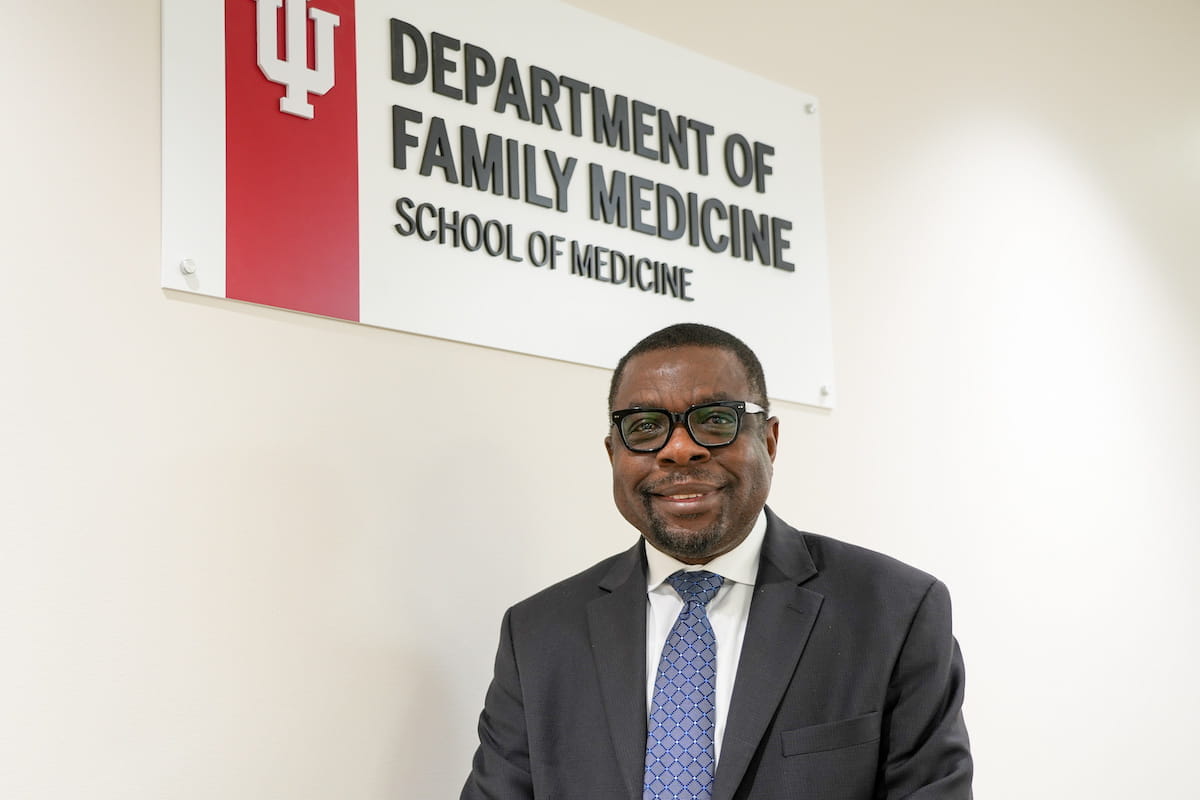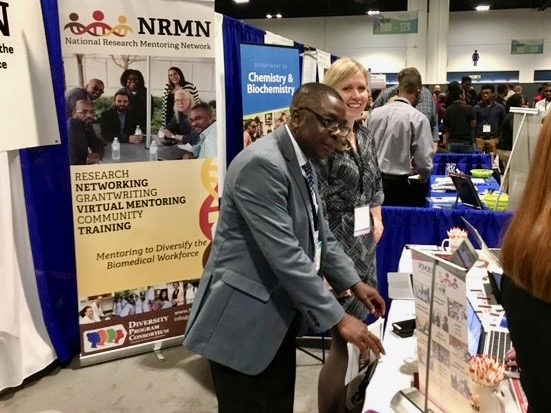Family Medicine chair aims to bridge the gaps in health care

Laura Gates May 29, 2024
IN THE REGION of Lagos, Nigeria, where Kolawole “Kola” Okuyemi, MD, MPH, was born and raised, the concept of “family” extended beyond parents and siblings to relatives and others living communally in his village. For reasons unknown to Okuyemi, his father started calling him “the doctor” around age 10, shortly before his father’s passing.
“I wanted to fulfill the dream of what my dad wanted for me,” said Okuyemi, now chair of the Department of Family Medicine and associate dean for health equity research and implementation at the Indiana University School of Medicine. “He died of complications from diabetes, and I thought, ‘Shouldn’t somebody have been able to do something about that?’ So, that's where the passion to go into medicine grew in me.”
Lagos — Nigeria’s most populous city — is known for stark wealth disparities. According to a recent World Bank study, 80% of households are classified as poor, and 50-75% of the city’s population lives in informal settlements, known as slums. Most people in the city and its outlying villages lack basic sanitation needs, like clean water and waste collection, and have limited access to health care. Yet, in the same city, wealthy neighborhoods compare to many U.S. suburbs with amenities and luxuries like private jets.
After completing medical school at Nigeria’s University of Ilorin, training in family medicine and an obligatory year of national medical service, Okuyemi set his sights on going to the United States to gain a new perspective while trying to “figure out my place in life.” He estimates he sent out 100 applications for opportunities he saw advertised in journals at the library, ultimately landing a fellowship in public health research at Morehouse School of Medicine in Atlanta.

“I don’t think people know how folks outside of the U.S. think about America — it is a place where all your problems are solved,” said Okuyemi. He now laughs at his naiveté. “Some say it’s God’s own country, where everything works, everybody is healthy, you walk on gold.
“And then you get to America — how was that a shocker — you drive through different neighborhoods and see the stark differences. I said, ‘Wow, so, the people are the same?’”
Okuyemi quickly discovered disparities are not exclusive to developing nations. He saw health inequities in rural Georgia, in Kansas (where he completed a family medicine residency and earned a master’s in public health at the University of Kansas Medical Center), in Minnesota while on faculty with the University of Minnesota, and in Utah, where he was the chair of family and preventive medicine at the Spencer Fox Eccles School of Medicine at the University of Utah before coming to IU.
And now, in Indiana, it’s the same story.
“Everywhere I went, people are people, but there are differences in opportunities,” Okuyemi said. “There needs to be a way to bridge the gap between opportunities in low-resourced and high-resourced areas. That is how my passion grew.”
ADVANCING HEALTH EQUITY
Over the last two decades, Okuyemi’s career has focused on research and training programs to improve the health of underserved populations and advance health equity.
“You have these stark differences in access to education, access to health-related resources and infrastructure — those things we call social determinants of health — that begin to affect lifespan even from birth,” he said. “We say commonly that the ZIP code where a person lives actually is a stronger determinant of how healthy they are and how long they and their families live, versus their genetic compositions.”
Okuyemi sees opportunities for positive change in Indiana, aided by IU School of Medicine’s statewide campuses and health system partnerships.
“I saw a commitment to address health equity at IU that is probably much stronger, much more genuine, because it's aligned to the needs of the (entire) state,” Okuyemi said. “I think this is a place where I can really make a difference, and it's a place where I see a strong collaborative model. People like to work together.”
A prolific scientific investigator, Okuyemi’s research has been continuously funded by the National Institutes of Health for more than 20 years with grant awards totaling more than $50 million. He has authored nearly 200 peer-reviewed studies focusing on cancer- and smoking-related health disparities experienced by African Americans, Sub-Saharan African immigrants and people experiencing homelessness. Okuyemi also co-founded a nationwide mentoring network for biomedical researchers.
His vision for the Department of Family Medicine includes growing its research portfolio, particularly around health equity.
“My vision is for us to become a leading, top-tier academic family medicine department,” Okuyemi said. “And for us to do that, we need to be strong in the educational mission, in the clinical mission and also in the research mission with research across the translational spectrum, both biological, clinical and community aspects.”
In his role as the dean for health equity research and implementation, he likes to emphasize the “implementation” part “because that’s usually where the gap is.” His job, he explained, is to “connect the dots” to create a collaborative environment where scientific discoveries make it to the patient and community levels and improve people’s lives.
“A lot of research has been done, a lot of knowledge has been discovered, and a lot of evidence has been generated about how to close the health disparities gap,” Okuyemi said. “But where the gap is, is translating what we know into community benefit.”
MENTORING BIOMEDICAL SCIENTISTS
Okuyemi’s other passion is scientific mentorship. He was lead investigator on an NIH-funded initiative that established the National Research Mentoring Network (NRMN), which pairs grad students and early-career biomedical researchers from diverse backgrounds with mentors for professional development, particularly in grant writing.
Through this work, Okuyemi’s influence was already present at IU School of Medicine long before he moved to Indiana to lead the Department of Family Medicine in early 2024. Gustavo Arrizabalaga, PhD, assistant dean for faculty affairs and professional development, trained under Okuyemi through the NRMN and became a grant-writing coach for the program.
“I brought their curriculum to IU, and now, every semester, we run mentor training workshops,” Arrizabalaga said. “We have trained over 200 faculty here through this program. Our faculty are greatly benefiting from what Kola started on a national level.”

Okuyemi is currently leading a study examining the success of NRMN mentorship models.
“One of the things I learned is that mentoring is not a trial-and-error thing, which is the way many people who grew up in my generation did mentorship,” he said. “What NRMN has done is let people know there’s actually a science to mentorship. NRMN provides evidence-based mentorship to folks in the biomedical workforce across multiple disciplines and across the full spectrum of career levels.”
As a Black physician, scientist and immigrant, Okuyemi understands the challenges faced by early-career researchers from diverse backgrounds.
“Many research teams still believe that success in academia has nothing to do with whether you're Black or Native American or Latino, or whether you're a woman or from a sexual or gender minority group — that all we want to know is what you know about science, and all those other things are distractions,” he said. “That is not true. Many times, we lose people in academia because we fail to recognize these types of challenges and provide mentorship support for them.”
Rick McGee, PhD, a founding investigator for the NRMN from Northwestern University Feinburg School of Medicine, said Okuyemi is a collaborative leader who values the collective experiences of everyone on the team.
“He is always looking for things that work and taking the lead to implement and expand their impact,” McGee said. “Kola’s efforts are highly focused on making sure early-career researchers have access to mentoring and coaching that is critical for everyone’s success.”

Considering the passion with which Okuyemi speaks, it’s difficult to believe when he says he’s a “recovering introvert” who works hard to make friends and engage in conversations. His gift, attested by many former patients and mentees, is listening — a critical skill in the expansive field of family medicine.
Okuyemi cherishes a letter he received 15 years ago from a patient who wrote, “You have made me feel like a person. Despite my complicated medical problems, you took time to listen to me, and you gave me hope. Now I’m going to find a way to pay this forward.”
“If that patient was the only reason I went into medicine,” Okuyemi said, “I think I’ve fulfilled my calling.”
Laura Gates
Laura is a senior writer with the Office of Strategic Communications. A native Hoosier, she has 25 years of experience in communications, having worked with newspapers and other media organizations in Indiana and Florida, along with small businesses, community groups and non-profit organizations. Before joining IU School of Medicine in January 2020, she was editor-in-chief of a lifestyle magazine serving the community of Estero, Florida.